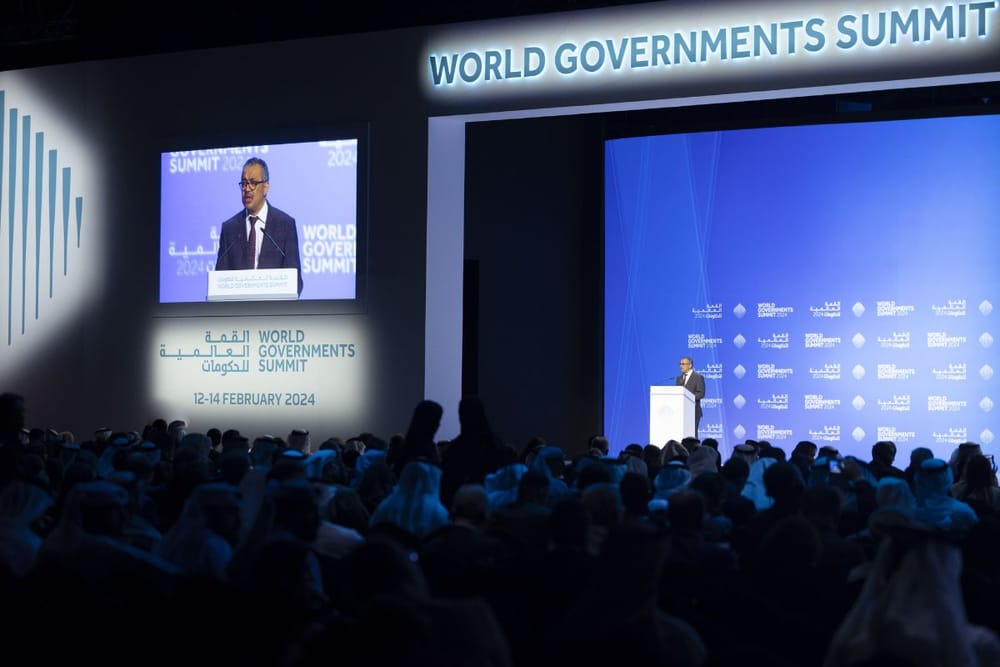The World Health Organisation (WHO) Director General Dr. Tedros Ghebreyesus said the world is not yet ready to deal with emergencies and crises, and that the repercussions of COVID-19 can still be felt.
Delivering a main address on the first day of the World Governments Summit (WGS) 2024 entitled ‘A Pact with the Future: Why the Pandemic Agreement is Mission-Critical for Humanity’, Dr. Ghebreyesus said several terms under the ‘Pandemic Prevention, Preparedness and Response Accord’ signed in Geneva in 2021, have not been met by WHO members.
Dr. Ghebreyesus praised the UAE’s efforts and leading role in prioritising health in its climate action agenda, when it hosted the COP28 UN Climate Change Conference of the Parties in December 2023, which stated in its final declaration that the climate crisis is essentially a health crisis.
“I thank the UAE for its support for the WHO Global Logistics Hub here in Dubai, which has become an essential part of WHO’s operational response to health emergencies around the world. Last year, the hub distributed medical supplies for 50 million people in emergency situations in 81 countries, in every region of the world – Afghanistan, Chad, Fiji, Haiti, Papua New Guinea, Sri Lanka, Ukraine, Venezuela, Yemen and more,”
he said.
“The hub is currently playing a vital role in our response to several emergencies around the world, including the ongoing crisis in Gaza. So far, we have delivered 447 metric tons of medical supplies to Gaza, but it’s a drop in the ocean of need, which continues to grow every day. Only 15 out of 36 hospitals are still partially or minimally functional in Gaza. Health workers are doing their best in impossible circumstances. I am especially concerned by the recent attacks on Rafah, where the majority of Gaza’s population has fled from the destruction to the north. WHO continues to call for safe access for humanitarian personnel and supplies; we continue to call for hostages held by Hamas to be released; and we continue to call for a ceasefire,”
he added.
Dr. Ghebreyesus said he had predicted six years ago that a pandemic would break out, and had warned that the world was not ready for that. The Covid-19 pandemic broke out less than two years later, he said.
“Today I stand before you, in the aftermath of COVID-19, With millions of people dead, social, economic and political shocks that reverberate to this day. Although some progress has been made, like improvements in surveillance, the Pandemic Fund, building capacities in vaccine production and the periodic review we have started, still, the world is not prepared for a pandemic. The painful lessons we learned are in danger of being forgotten, but if we fail to learn those lessons, we will pay dearly next time. History teaches us that the next pandemic is a matter of when, not if.”
He added:
“There’s been a lot of attention on Disease X recently, but in fact, it’s not a new thing. If it struck tomorrow, we would face many of the same problems we faced with COVID-19. It’s for this reason that in December 2021, WHO’s Member States met in Geneva and agreed to develop an international agreement on pandemic preparedness and response. With the deadline approaching in May 2024, there are issues on which countries have not yet reached consensus.”
Explaining the crucial role of the pandemic agreement, he said:
“The pandemic agreement is a commitment to national security. Because pathogens have no regard for the lines humans draw on maps, nor for the color of our politics, the size of our economies or the strength of our military. We are one humanity, the same species, sharing the same DNA and the same planet. We have no future but a common future.”
Dr. Ghebreyesus dismissed rumors circulating about the WHO’s plan to dominate the world, restrict freedoms and impose new global restrictions.
“We cannot allow this historic agreement to be sabotaged by those who spread lies. Our job is to support governments with evidence-based guidance, advice and, when needed, supplies, to help them protect their people. But the decisions are theirs. WHO did not impose lockdowns or mask mandates,”
he emphasized.
In conclusion, Dr. Ghebreyesus said:
“Now is the time to say ‘No’ to lies and misinformation; and ‘Yes’ to international cooperation; equity and solidarity. As the generation that lived through COVID-19, we have a collective responsibility to protect future generations from the suffering we endured. May history record that we rose to that responsibility.”
In its 11th edition, the WGS 2024 brings together 85 international organizations, 140 governments, more than 25 heads of state, 700 heads of major international companies, and more than 4,000 experts and officials.
News Source: Emirates News Agency









